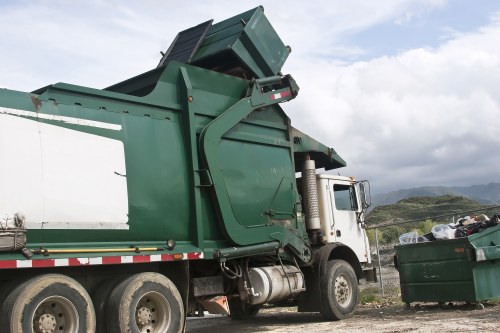Efficient Waste Disposal Solutions in London
Understanding Waste Disposal in London

Waste disposal in London is a critical aspect of maintaining the city's cleanliness and sustainability. With a population exceeding 8 million, managing waste efficiently is essential to ensure public health and environmental protection.
The city has implemented various waste management strategies to handle residential, commercial, and industrial waste. These strategies not only focus on disposal but also emphasize recycling and waste reduction.
One of the primary challenges in waste disposal is the sheer volume of waste generated daily. Effective waste management requires coordinated efforts between local authorities, businesses, and residents.
Types of Waste Managed in London

London deals with several types of waste, each requiring specific disposal methods:
- Household Waste: Includes everyday items such as food scraps, packaging, and household items.
- Commercial Waste: Generated by businesses, offices, and retail establishments.
- Industrial Waste: Produced by manufacturing processes and other industrial activities.
- Hazardous Waste: Materials that are dangerous or potentially harmful, such as chemicals and batteries.
Proper categorization and treatment of these waste types are crucial for effective disposal and recycling.
Recycling plays a significant role in reducing the overall waste footprint. London encourages residents and businesses to participate in recycling programs to minimize landfill use.
In addition to recycling, waste-to-energy initiatives are gaining traction as sustainable disposal methods that also generate energy.
Recycling Initiatives in London

London has established extensive recycling programs to manage waste more sustainably. These initiatives aim to reduce the amount of waste sent to landfills and promote the reuse of materials.
Residents are provided with separate bins for recyclable materials such as paper, plastic, glass, and metals. Regular collection schedules ensure that recyclables are efficiently processed.
The city also hosts numerous recycling centers where individuals can drop off larger items and electronics, which are then processed for reuse or safe disposal.
Commercial and industrial entities are encouraged to adopt recycling practices through incentives and regulatory requirements. This collaboration between public and private sectors enhances the overall effectiveness of waste management.
Educational campaigns raise awareness about the importance of recycling and how individuals can contribute to waste reduction efforts.
By fostering a culture of recycling, London aims to create a more sustainable and environmentally friendly urban environment.
Challenges in Waste Disposal

Despite numerous initiatives, waste disposal in London faces several challenges:
- High Population Density: Concentrated populations generate large volumes of waste, straining disposal systems.
- Limited Landfill Space: As landfills near capacity, finding new disposal sites becomes increasingly difficult.
- Public Compliance: Ensuring consistent participation in recycling programs can be challenging.
- Cost Management: Effective waste management requires significant financial investment.
- Environmental Regulations: Adhering to strict environmental standards adds complexity to disposal processes.
Addressing these challenges requires innovative solutions and sustained commitment from all stakeholders involved.
Technological advancements in waste processing and recycling can help mitigate some of these issues by increasing efficiency and reducing costs.
Innovative Waste Disposal Solutions

London is embracing innovative waste disposal solutions to enhance sustainability:
- Automated Waste Collection: Utilizing smart technology to optimize waste collection routes and schedules.
- Advanced Recycling Techniques: Implementing cutting-edge methods for material separation and processing.
- Composting Programs: Converting organic waste into compost for use in urban gardens and green spaces.
- Waste-to-Energy Plants: Transforming non-recyclable waste into energy through incineration or other processes.
- Plastic Reduction Initiatives: Reducing single-use plastics and promoting alternative materials.
These solutions not only improve waste management efficiency but also contribute to London's broader environmental goals.
Community engagement and support are essential for the successful implementation of these innovative practices.
By leveraging technology and fostering collaboration, London is paving the way for a more sustainable future in waste disposal.
Conclusion

Waste disposal in London is a complex but essential task that requires a multifaceted approach. Through effective management strategies, recycling initiatives, and innovative solutions, the city strives to maintain cleanliness and sustainability.
Residents, businesses, and local authorities must work together to overcome challenges and achieve long-term waste management goals.
By adopting responsible waste disposal practices, London can continue to thrive as a vibrant, sustainable metropolis.
Contact us today to learn more about our waste disposal services and how you can contribute to a cleaner London.